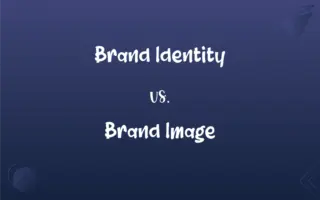Paternal vs. Maternal: What's the Difference?
Edited by Janet White || By Harlon Moss || Updated on August 22, 2024
Paternal pertains to fathers or fatherhood, while maternal relates to mothers or motherhood.

Key Differences
Paternal and maternal are terms derived from Latin, which describe relationships or qualities associated with fathers and mothers, respectively. The term "paternal" originates from the Latin word "pater" which means "father." It encompasses everything that is related to or characteristic of a father. Conversely, "maternal" stems from the Latin word "mater," meaning "mother," signifying everything tied to or characteristic of a mother.
In family trees or genealogy, when tracing lineage or ancestry, "paternal" is used to describe the father's side of the family, while "maternal" pertains to the mother's side. If one were to discuss their paternal grandparents, they would be referring to the grandparents on their father's side. Conversely, maternal grandparents would mean the grandparents on their mother's side.
From a behavioral or psychological standpoint, when referring to instincts or feelings, the term "paternal" denotes those associated with fathers. For instance, a paternal instinct might reflect a father's inherent drive to protect and provide for his offspring. On the other hand, "maternal" instincts or feelings are those inherently linked to mothers, often highlighting a mother's nurturing and caring nature towards her children.
In medicine and genetics, "paternal" and "maternal" are used to describe genes or traits inherited from a person's father or mother, respectively. Paternal genes are those derived from the father, while maternal genes come from the mother. This distinction is crucial in understanding inherited characteristics and potential genetic disorders.
Comparison Chart
Origin
Derived from Latin "pater" for "father"
Derived from Latin "mater" for "mother"
ADVERTISEMENT
Lineage
Relates to the father's side of the family
Relates to the mother's side of the family
Instincts/Feelings
Associated with fatherly instincts/feelings
Associated with motherly instincts/feelings
Inheritance (Genetics)
Genes or traits inherited from the father
Genes or traits inherited from the mother
Role in Parenting
Reflects the role or qualities of a father
Reflects the role or qualities of a mother
Paternal and Maternal Definitions
Paternal
Of or relating to a father.
His paternal instincts kicked in.
ADVERTISEMENT
Maternal
Motherly; characteristic of a mother.
She gave a maternal smile.
Paternal
Of the line of descent traced through the father.
His paternal lineage is French.
Maternal
Of or relating to a mother.
Her maternal instincts are strong.
Paternal
Fatherly; befitting a father.
He had a paternal manner.
Maternal
Of the line of descent traced through the mother.
Her maternal ancestry is German.
Paternal
Inherited from the father's side.
The trait is on his paternal side.
Maternal
Nurturing and protective like a mother.
She had a maternal touch.
Paternal
Protective and caring like a father.
He offered a paternal arm around her.
Maternal
Inherited from the mother's side.
The gene is from her maternal line.
Paternal
Relating to or characteristic of a father or fatherhood; fatherly.
Maternal
Relating to or characteristic of a mother or motherhood; motherly
Maternal instinct.
Paternal
Received or inherited from a father
A paternal trait.
Maternal
Inherited from one's mother
A maternal trait.
Paternal
Related through one's father
My paternal aunt.
Maternal
Related through one's mother
My maternal uncle.
FAQs
Which term refers to the father's side of the family?
"Paternal" refers to the father's side.
Which term is used for traits inherited from the mother?
"Maternal" is used for traits from the mother.
Is the term "maternal" exclusive to humans?
No, it can be used to describe motherly attributes in animals as well.
Are "paternal" and "maternal" opposites?
Not opposites, but they refer to different parental roles: fatherly vs. motherly.
What's the origin of "paternal"?
It comes from the Latin word "pater," meaning "father."
Is there a maternal chromosome?
There isn't a "maternal chromosome," but mothers contribute an X chromosome.
Are "paternal" and "maternal" adjectives?
Yes, both are adjectives describing fatherly and motherly aspects, respectively.
Can "paternal" describe motherly qualities?
No, "paternal" describes fatherly qualities, while "maternal" describes motherly ones.
Can "paternal" be used in contexts beyond family?
Yes, it can describe anything characteristic of or suitable to a father.
Which term would describe a grandmother on the father's side?
She would be a "paternal grandmother."
Do "paternal" and "maternal" only refer to biological parents?
No, they can refer to qualities or relationships, not just biological connections.
Can an emotion be described as "maternal"?
Yes, especially if it's a feeling commonly associated with mothers.
Are there other words related to "paternal" in English?
Yes, like "paternity" which relates to fatherhood.
Is "paternal" used in legal contexts?
Yes, especially in situations like "paternal rights."
Is "paternal" always about genetics?
No, it can describe characteristics, roles, or relationships tied to fathers.
And the origin of "maternal"?
It's derived from the Latin "mater," meaning "mother."
How about related words for "maternal"?
"Maternity" is one, relating to motherhood.
Can "maternal" describe a protective instinct?
Absolutely, it often describes a mother's protective nature.
In genetics, which chromosome is paternal?
The Y chromosome is paternal, coming from the father.
Can they be used in cultural contexts?
Yes, to describe cultural traits or roles linked to fathers or mothers.
About Author
Written by
Harlon MossHarlon is a seasoned quality moderator and accomplished content writer for Difference Wiki. An alumnus of the prestigious University of California, he earned his degree in Computer Science. Leveraging his academic background, Harlon brings a meticulous and informed perspective to his work, ensuring content accuracy and excellence.
Edited by
Janet WhiteJanet White has been an esteemed writer and blogger for Difference Wiki. Holding a Master's degree in Science and Medical Journalism from the prestigious Boston University, she has consistently demonstrated her expertise and passion for her field. When she's not immersed in her work, Janet relishes her time exercising, delving into a good book, and cherishing moments with friends and family.






































































